Unveiling Tipping Points in European Sustainability: A Nonlinear MARS Approach to People, Planet, and Prosperity
Abstract
1. Introduction
- To construct composite indices for the People, Planet, and Prosperity domains using PCA, thereby capturing the latent structure of domain-specific SDG performance.
- To examine the joint and nonlinear effects of these domains on the overall SDG Index Score using MARS, allowing for the identification of thresholds and interaction effects.
- To provide actionable insights for policy prioritisation by revealing which sustainability domains exert the most decisive influence on overall progress and where domain imbalances may impede the achievement of the 2030 Agenda in Europe.
2. Theoretical Background
- Domain-specific decomposition is crucial for uncovering the actual structure of SDG performance and avoiding the masking effects of aggregated indices.
- Nonlinear and threshold-based modelling more accurately reflects sustainability dynamics than conventional linear methods.
- Integrating PCA and MARSs provides a comprehensive framework for analysing both the latent structure of domain indices and their complex, interactive influence on overall SDG outcomes, offering actionable insights for evidence-based policymaking.
3. Methodology
3.1. Research Design
3.2. Data Sources and Variables
3.3. Assessment of Internal Consistency and Factorability
3.4. Construction of Sustainability Domains Indices
3.5. Multivariate Adaptive Regression Splines (MARSs)
4. Results
4.1. Assessment of Internal Consistency and Factorability of SDG Domain Constructs
4.2. Constructing the Indexes for Sustainability Domains
4.3. Modelling the Influence of Sustainability Domains on SDG Progress Using Multivariate Spline Regression
4.4. Visualising Nonlinear and Interaction Effects Among Domains
5. Discussion
5.1. Overview of the Main Findings
5.2. Thresholds and Nonlinearities in SDG Progress
5.3. Comparisons with Existing Studies
5.4. Policy Implications
5.5. Limitations and Future Research Directions
6. Conclusions
Author Contributions
Funding
Institutional Review Board Statement
Informed Consent Statement
Data Availability Statement
Acknowledgments
Conflicts of Interest
References
- United Nations. Transforming Our World: The 2030 Agenda for Sustainable Development; United Nations: New York, NY, USA, 2015; Available online: https://sdgs.un.org/2030agenda (accessed on 28 June 2025).
- Sachs, J.D.; Lafortune, G.; Fuller, G. The SDGs and the UN Summit of the Future. Sustainable Development Report 2024; SDSN: Paris, France; Dublin University Press: Dublin, Ireland, 2024. [Google Scholar] [CrossRef]
- Sachs, J.; Kroll, C.; Lafortune, G.; Fuller, G. The Sustainable Development Goals and COVID-19. In Sustainable Development Report; Cambridge University Press: Cambridge, UK, 2022; pp. 1–52. [Google Scholar]
- Griggs, D.; Nilsson, M.; Stevance, A.; McCollum, D. A Guide to SDG Interactions: From Science to Implementation; International Council for Science (ICSU): Paris, France, 2017; Available online: https://council.science/wp-content/uploads/2017/05/SDGs-Guide-to-Interactions.pdf (accessed on 28 June 2025).
- Miola, A.; Schiltz, F. Measuring Sustainable Development Goals Performance: How to Monitor Policy action in the 2030 agenda implementation? Ecol. Econ. 2019, 164, 106373. [Google Scholar] [CrossRef]
- Gracia-de-Rentería, P.; Ramos, R.; Artal-Tur, A. Sustainable Development Goals in the European Union and Its Regions: Measuring Progress and Spatial Disparities. Sustain. Dev. 2023, 31, 456–472. [Google Scholar] [CrossRef]
- Kudełko, J. Development Sustainability Levels in EU Countries. Sustain. Dev. 2024, 32, 1234–1251. [Google Scholar] [CrossRef]
- Grzebyk, M.; Stec, M. Sustainable Development in EU Countries: Concept and Rating of Levels of Development. Sustain. Dev. 2015, 23, 110–123. [Google Scholar] [CrossRef]
- Zhou, K.; Chen, H.; Ismail, M.; Yang, T. Assessment of Sustainable Development Levels, Country Disparities, and Dynamic Evolution Trends of ASEAN-10 Countries. Sustain. Dev. 2025, 1–22. [Google Scholar] [CrossRef]
- Idris, A.; Razak, A.R. Energy Transition, Green Growth and Emission on Economic Growth Using Spline Approach: Evidence from Asia-Pacific Countries. Econ. Innov. Econ. Res. J. 2025, 13, 139–159. [Google Scholar] [CrossRef]
- Saeed, U.F. Achieving SDGs in Developing Economies: A CS-ARDL Analysis of the Effects of Industrial Growth and Foreign Investment on Carbon and Ecological Footprints. J. Sustain. Financ. Account. 2025, 8, 100025. [Google Scholar] [CrossRef]
- Barbier, E.B.; Burgess, J.C. Sustainable Development and the Dynamics of Economic and Environmental Systems. Environ. Dev. Econ. 2019, 24, 451–470. [Google Scholar] [CrossRef]
- Allen, C.; Metternicht, G.; Wiedmann, T. Initial Progress in Implementing the Sustainable Development Goals (SDGs): A Review of Evidence from Countries. Sustain. Sci. 2018, 13, 1453–1467. [Google Scholar] [CrossRef]
- Lopatkova, Y. Achieving Sustainable Development: A Baseline Analysis of Western and Eastern European Countries. R-Economy 2021, 7, 18–27. [Google Scholar] [CrossRef]
- Fukuda-Parr, S.; McNeill, D. Knowledge and Politics in Setting and Measuring SDGs: Introduction to Special Issue. Glob. Policy 2019, 10 (Suppl. S1), 5–15. [Google Scholar] [CrossRef]
- Biermann, F.; Kim, R.E. Architectures of Earth System Governance: Institutional Complexity and Structural Transformation. Curr. Opin. Environ. Sustain. 2020, 42, 51–57. [Google Scholar] [CrossRef]
- United Nations. Sustainable Development Goals Knowledge Platform: 5P Approach (People, Planet, Prosperity, Peace, Partnerships). Available online: https://sdgs.un.org/ (accessed on 28 June 2025).
- Carlsen, L. The State of the ‘Prosperity’ Pillar by 2022: A Partial Ordering-Based Analysis of the Sustainable Development Goals 7–11. Green Finance 2023, 5, 89–101. [Google Scholar] [CrossRef]
- Liashenko, O.; Mykhailovska, O.; Shestakovska, T.; Selyutin, S. Effectiveness of Governance vs. Social Development: A Multivariate Approach to Countries’ Classification. Adm. Manag. Public. 2024, 42, 6–24. [Google Scholar] [CrossRef]
- Trane, M.; Marelli, L.; Siragusa, A.; Pollo, R.; Lombardi, P. Progress by Research to Achieve the Sustainable Development Goals in the EU: A Systematic Literature Review. Sustainability 2023, 15, 7055. [Google Scholar] [CrossRef]
- Mazziotta, M.; Pareto, A. Methods for Constructing Composite Indices: One for All or All for One? Ital. Econ. J. 2016, 2, 229–253. Available online: https://scispace.com/pdf/methods-for-constructing-composite-indices-one-for-all-or-g1ws6c33dz.pdf (accessed on 20 August 2025).
- Mazziotta, M.; Pareto, A. Use and Misuse of PCA for Measuring Well-Being. Soc. Indic. Res. 2018, 142, 451–476. [Google Scholar] [CrossRef]
- Mazziotta, M.; Pareto, A. Methods for Constructing Non-Compensatory Composite Indices: A Comparative Study. Forum Soc. Econ. 2015, 45, 213–229. [Google Scholar] [CrossRef]
- Jolliffe, I.T.; Cadima, J. Principal Component Analysis: A Review and Recent Developments. Philos. Trans. R. Soc. A 2016, 374, 20150202. [Google Scholar] [CrossRef]
- Kroll, C.; Warchold, A.; Pradhan, P. Sustainable development goals (SDGs): Are we successful in turning trade-offs into synergies? Palgrave Commun. 2019, 5, 140. [Google Scholar] [CrossRef]
- Dörgő, G.; Sebestyén, V.; Abonyi, J. Evaluating the Interconnectedness of the Sustainable Development Goals Based on the Causality Analysis of Sustainability Indicators. Sustainability 2018, 10, 3766. [Google Scholar] [CrossRef]
- Le Blanc, D. Towards Integration at Last? The Sustainable Development Goals as a Network of Targets. Sustain. Dev. 2015, 23, 176–187. [Google Scholar] [CrossRef]
- OECD. Measuring Distance to the SDG Targets 2019: An Assessment of Where OECD Countries Stand; OECD Publishing: Paris, France, 2019. [Google Scholar] [CrossRef]
- Hastie, T.; Tibshirani, R.; Friedman, J. The Elements of Statistical Learning: Data Mining, Inference, and Prediction; Springer: New York, NY, USA, 2001. [Google Scholar] [CrossRef]
- Perperoglou, A.; Sauerbrei, W.; Abrahamowicz, M. A Review of Spline Function Procedures in R. BMC Med. Res. Methodol. 2019, 19, 46. [Google Scholar] [CrossRef]
- Naser, A.; Badr, A.; Henedy, S.N.; Ostrowski, K.A.; Imran, H. Application of Multivariate Adaptive Regression Splines (MARS) Approach in Prediction of Compressive Strength of Eco-Friendly Concrete. Case Stud. Constr. Mater. 2022, 17, e01262. [Google Scholar] [CrossRef]
- Eilers, P.H.C.; Marx, B.D. Splines, Knots, and Penalties. Wiley Interdiscip. Rev. Comput. Stat. 2010, 2, 637–653. [Google Scholar] [CrossRef]
- Friedman, J.H. Multivariate Adaptive Regression Splines. Ann. Stat. 1991, 19, 1–67. [Google Scholar] [CrossRef]
- Liashenko, O.; Dluhopolskyi, O. The Statistical Approach to Understanding the Interdependencies among Sustainable Development Goals. Econ. -Innov. Econ. Res. J. 2025, 13, 449–467. [Google Scholar] [CrossRef]
- Griggs, D.; Stafford-Smith, M.; Gaffney, O.; Rockström, J.; Öhman, M.C.; Shyamsundar, P.; Steffen, W.; Glaser, G.; Kanie, N.; Noble, I. Policy: Sustainable Development Goals for People and Planet. Nature 2013, 495, 305–307. [Google Scholar] [CrossRef]
- Biggeri, C.; Clark, D.A.; Ferrannini, A.; Mauro, V. Tracking the SDGs in an ‘Integrated’ Manner: A Proposal for a New Index to Capture Synergies and Trade-Offs between and within Goals. World Dev. 2019, 122, 628–647. [Google Scholar] [CrossRef]
- Kanie, N.; Biermann, F. (Eds.) Governing Through Goals: Sustainable Development Goals as Governance Innovation; MIT Press: Cambridge, MA, USA, 2017. [Google Scholar]
- Kuc-Czarnecka, M.; Markowicz, I.; Sompolska-Rzechuła, A. SDGs Implementation, Their Synergies, and Trade-Offs in EU Countries—Sensitivity Analysis-Based Approach. Ecol. Indic. 2023, 146, 109888. [Google Scholar] [CrossRef]
- Košíková, M.; Vašaničová, P. Exploring the Link between Digital Readiness and Sustainable Development: A Cluster Analysis of EU Countries. Sustainability 2025, 17, 5080. [Google Scholar] [CrossRef]

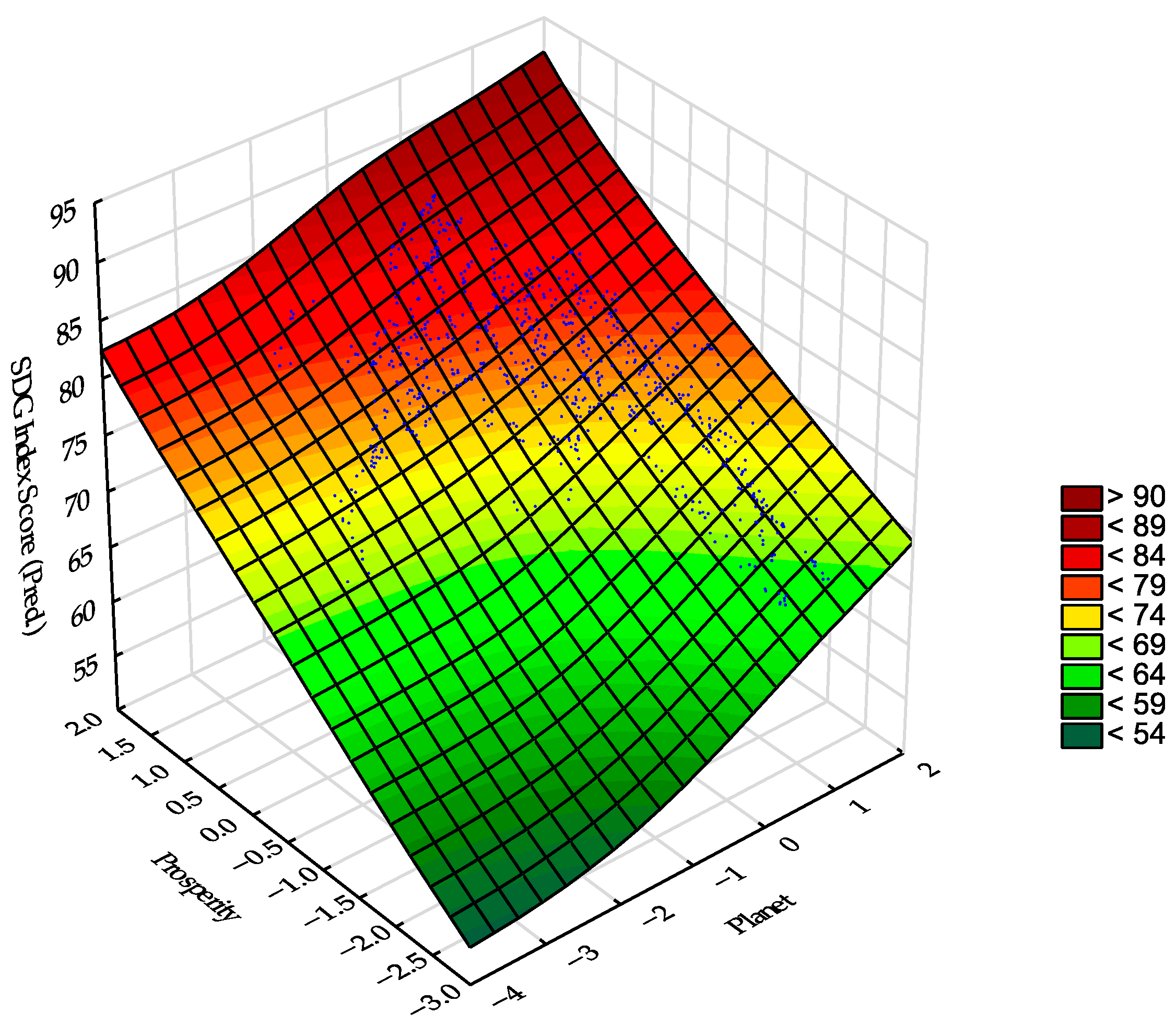
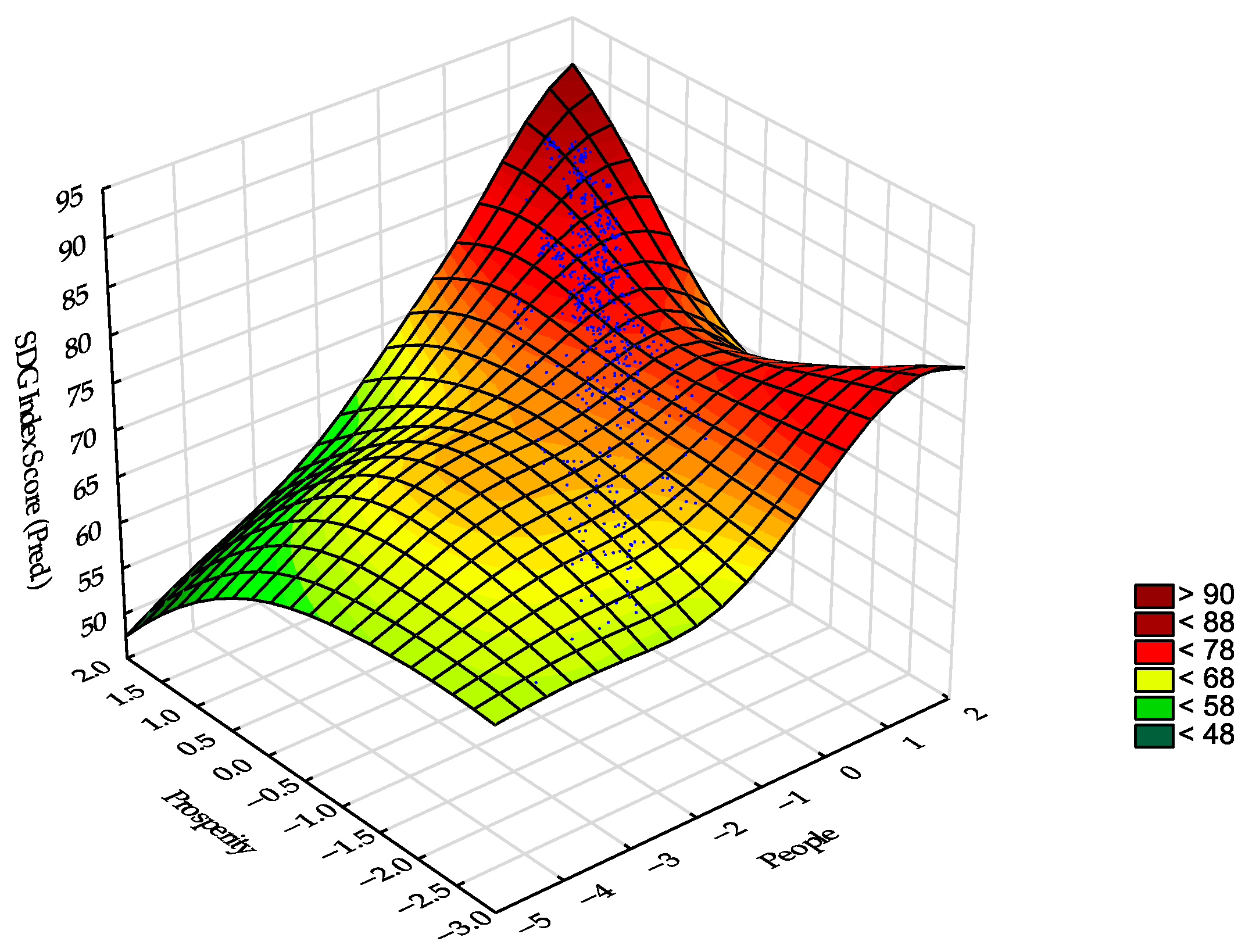
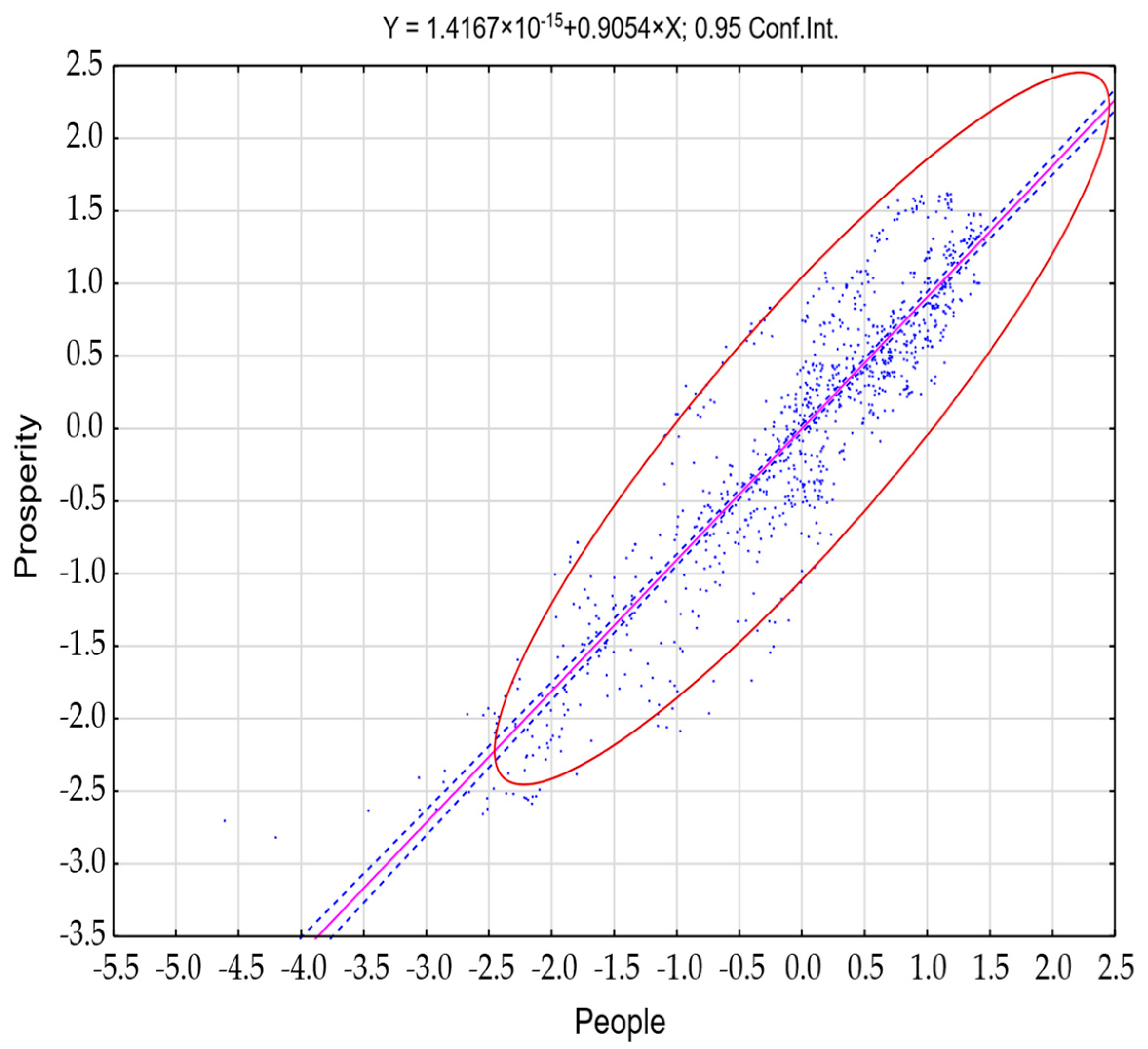
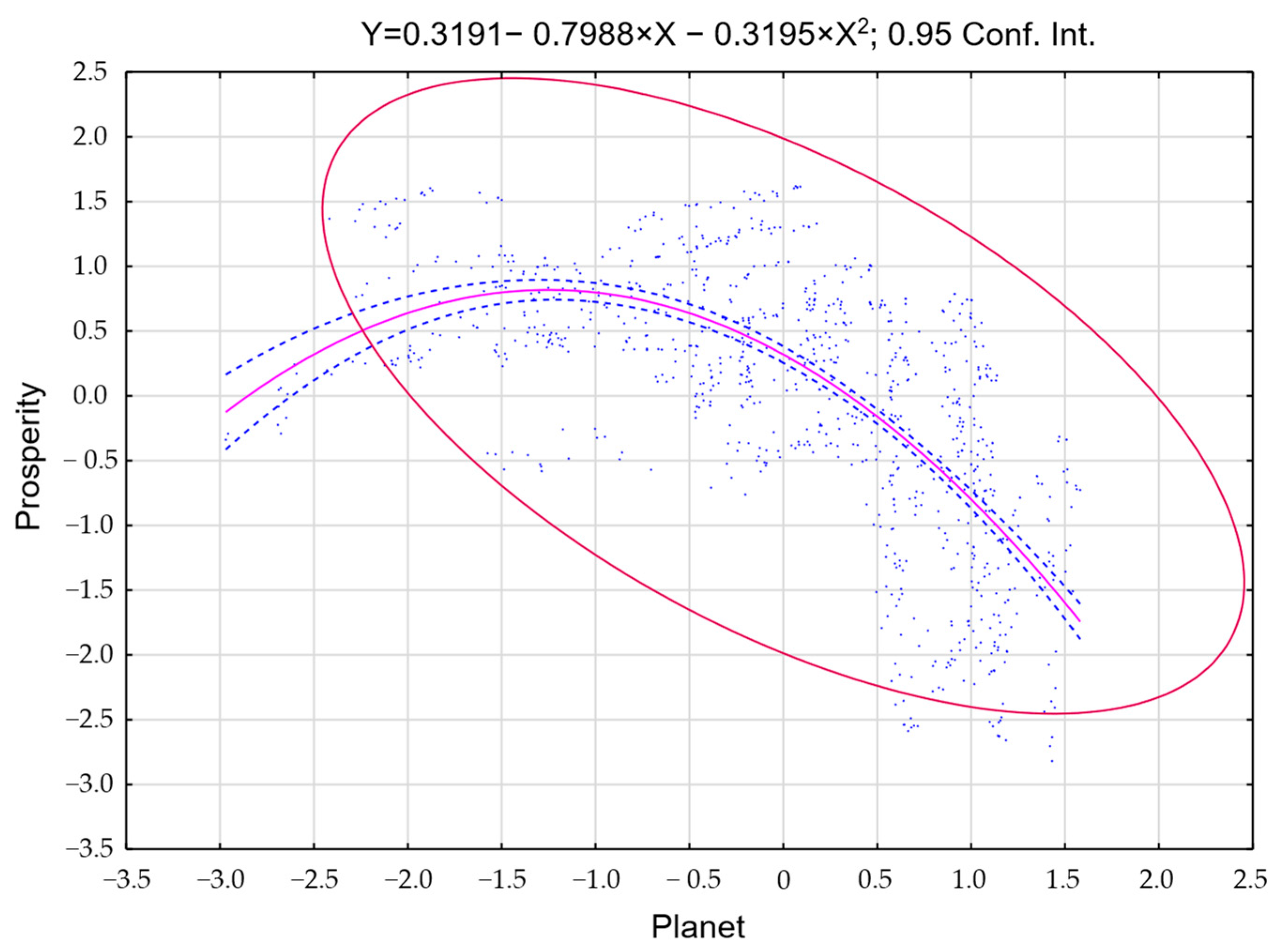
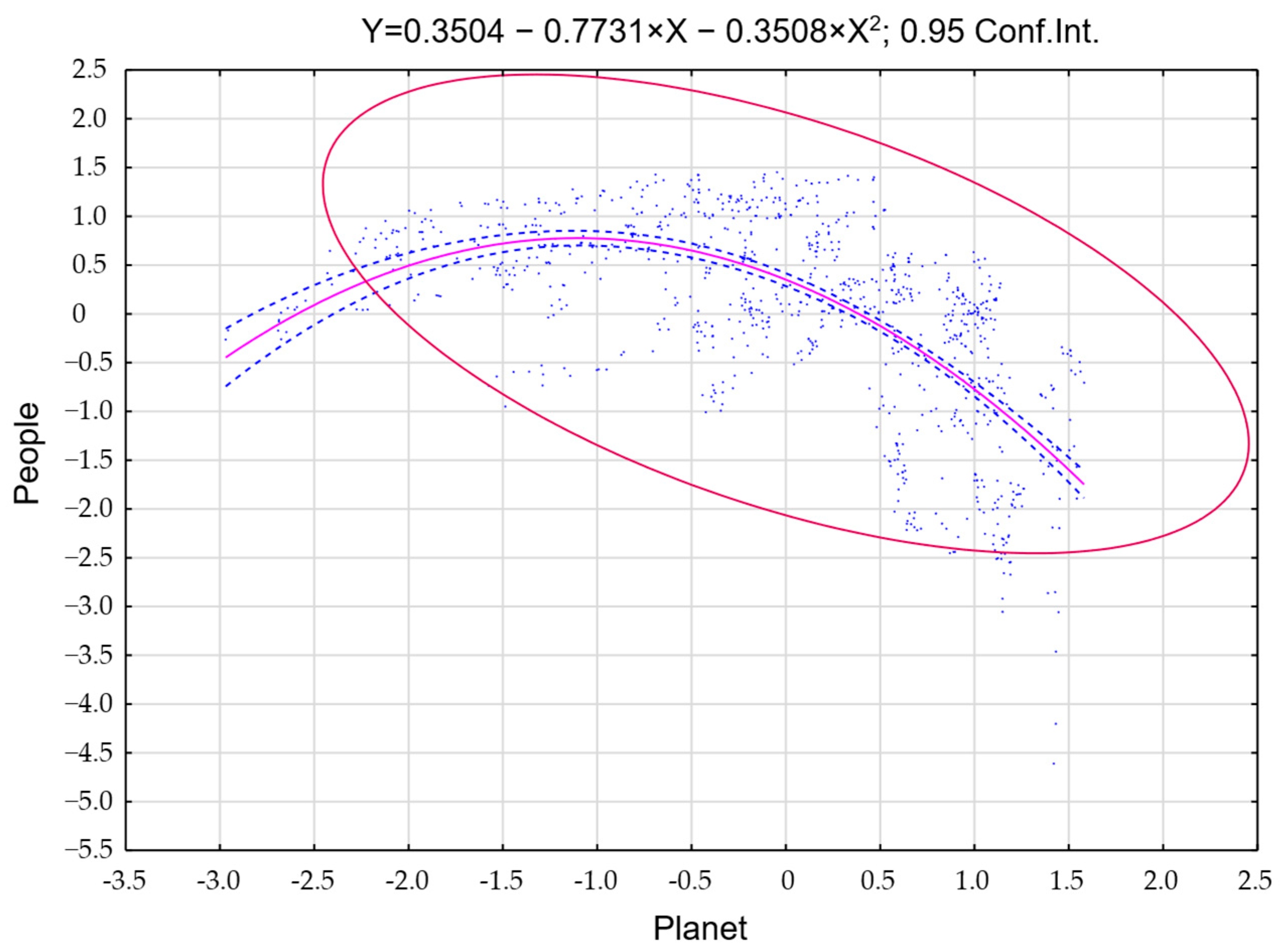
| Domain | SDG | SDG Title |
|---|---|---|
| People | SDG 1 | No Poverty |
| SDG 2 | Zero Hunger | |
| SDG 3 | Good Health and Well-being | |
| SDG 4 | Quality Education | |
| SDG 5 | Gender Equality | |
| SDG 6 | Clean Water and Sanitation | |
| Planet | SDG 12 | Responsible Consumption and Production |
| SDG 13 | Climate Action | |
| SDG 15 | Life on Land | |
| Prosperity | SDG 7 | Affordable and Clean Energy |
| SDG 8 | Decent Work and Economic Growth | |
| SDG 9 | Industry, Innovation and Infrastructure | |
| SDG 10 | Reduced Inequalities | |
| SDG 11 | Sustainable Cities and Communities |
| People | Planet | Prosperity | |||
|---|---|---|---|---|---|
| Variable | Factor 1 | Variable | Factor 1 | Variable | Factor 1 |
| goal1 | −0.178 | goal12 | 0.442 | goal7 | −0.177 |
| goal2 | −0.215 | goal13 | 0.45 | goal8 | −0.273 |
| goal3 | −0.279 | goal15 | 0.288 | goal9 | −0.305 |
| goal4 | −0.234 | - | - | goal10 | −0.229 |
| goal5 | −0.275 | - | - | goal11 | −0.301 |
| goal6 | −0.214 | - | - | - | - |
| Parameter | Value |
|---|---|
| Dependent variable | SDG Index Score |
| Independent variables | People, Planet, Prosperity |
| Number of terms | 16 |
| Basis functions used | 25 |
| Order of interactions | 2 |
| Penalisation parameter (λ) | 2.000 |
| Generalised Cross-Validation (GCV) error | 0.769 |
| R2 (adjusted) | 0.963 |
| Residual standard deviation | 0.848 |
| Predictor | References in Model |
|---|---|
| People | 9 |
| Planet | 9 |
| Prosperity | 7 |
Disclaimer/Publisher’s Note: The statements, opinions and data contained in all publications are solely those of the individual author(s) and contributor(s) and not of MDPI and/or the editor(s). MDPI and/or the editor(s) disclaim responsibility for any injury to people or property resulting from any ideas, methods, instructions or products referred to in the content. |
© 2025 by the authors. Licensee MDPI, Basel, Switzerland. This article is an open access article distributed under the terms and conditions of the Creative Commons Attribution (CC BY) license (https://creativecommons.org/licenses/by/4.0/).
Share and Cite
Liashenko, O.; Pavlova, O.; Pavlov, K.; Lechowicz, T.; Szarota, R.; Nagara, M.; Hrytsiyk, N. Unveiling Tipping Points in European Sustainability: A Nonlinear MARS Approach to People, Planet, and Prosperity. Sustainability 2025, 17, 8692. https://doi.org/10.3390/su17198692
Liashenko O, Pavlova O, Pavlov K, Lechowicz T, Szarota R, Nagara M, Hrytsiyk N. Unveiling Tipping Points in European Sustainability: A Nonlinear MARS Approach to People, Planet, and Prosperity. Sustainability. 2025; 17(19):8692. https://doi.org/10.3390/su17198692
Chicago/Turabian StyleLiashenko, Oksana, Olena Pavlova, Kostiantyn Pavlov, Tomasz Lechowicz, Robert Szarota, Maryna Nagara, and Nataliia Hrytsiyk. 2025. "Unveiling Tipping Points in European Sustainability: A Nonlinear MARS Approach to People, Planet, and Prosperity" Sustainability 17, no. 19: 8692. https://doi.org/10.3390/su17198692
APA StyleLiashenko, O., Pavlova, O., Pavlov, K., Lechowicz, T., Szarota, R., Nagara, M., & Hrytsiyk, N. (2025). Unveiling Tipping Points in European Sustainability: A Nonlinear MARS Approach to People, Planet, and Prosperity. Sustainability, 17(19), 8692. https://doi.org/10.3390/su17198692








